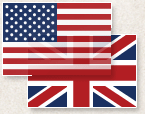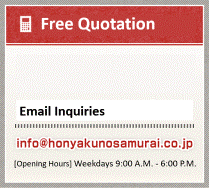Japanese ⇔ English Translations
 "Samurai Translators" follows the path of the translator.
We started out specializing in translations between Japanese and English and handle translations of a variety of documents from and into both Japanese to English. We have 100% confidence in our ability to produce excellent translations in this language pair.
"Samurai Translators" follows the path of the translator.
We started out specializing in translations between Japanese and English and handle translations of a variety of documents from and into both Japanese to English. We have 100% confidence in our ability to produce excellent translations in this language pair.
Samurai Translators has a wide range of expertise in numerous fields when it comes to Japanese and English translations, ranging from general documents to more specialized translation areas including Website Translations, Securities and Finance, Legal and Judicial, Technical, Medical and Pharmaceutical and Patent Translations. Whatever your translation needs whether they be big or small, please do not hesitate to contact us for advice.
We generally deliver a Certificate of Translation with translations of official documents. We issue Certificates of Translation in the language of the receiving individual or institution so in the case of translations from Japanese to English, we provide an English version and for translations from English to Japanese, we provide a Japanese version. The Certificate of Translation contains the signed and sealed declaration of the translator in charge of the translation stating that the same is sufficiently qualified and proficient in the relevant languages to translate the document and that the translation is a true and faithful translation of the original and is printed on company letterheaded paper.
A rough guide to our translation rates is given in the table below.
Why you need a translation team to get your translation right!
English ⇔ Japanese Translations and Native Speakers
The general consensus in the translation industry is that translations should be carried out by translators native in the target language. In the field of translation the term "target language" simply put is the language into which a document is translated into so in the case of English to Japanese translations, this would be Japanese and conversely for Japanese to English translations this would be English. This is attributed to the fact that generally a person's skill in his/her native language is superior to that in his/her second language. Indeed, in countries where qualifications for translators are available, generally there is an entirely separate qualification (license or certification) depending on which language a translator intends to translate into.
In the case of literary translations, if we take for example the translated English versions of the classic Japanese novel "The Tale of Genji", although the native Japanese Suematsu Kencho is said to have made the first-ever English version of the novel, the most widely accepted versions are those created by Arthur Waley, Edward Seidensticker and Royall Tyler all three of whom were native English speaking authors and translators. Suematsu Kencho's version is considered to be of poor quality and rarely read today. The reason for this is that although Suematsu Kencho was without a doubt able to read the original novel fluently and with full understanding of linguistic meaning and nuances, his ability to transfer the story into the target language was amateurish and unappealing to the reader. In contrast, Arthur Wayley's translation is a work of high literary value and has been well received by the public.
This, however, should not be taken to indicative of the dispensibility of translators native in the source language. It has been pointed out that there are a number of mistranslations, inconsistencies and omissions in Arthur Waylet's work. So while translations produced by native speakers of the target language read fluently and to all appearances seem to be correct, they may potentially be deficient in areas where the translator didn't fully understand the meaning of the original text or where the translator has misunderstood the intended meaning of the original and has effectively "composed" his/her own version based on his/her interpretation. In the case of literary works, deviating from the source text is acceptable to some extent as if the content in a translation of an original creative piece differs slightly from the original, it is of little consequence to the reader and is not thought to result in any real difficulties. Moreover style takes precedence over detail.
The same cannot be said in the case of industry related translations such as technical manuals, court rulings or a company's articles of incorporation/association where the primary aim is to create a translation which conveys the information in the original text exactly. There would be some serious concerns if the translation of these types of documents were to deviate from the original text as in the above Tale of Genji translation.
Japanese to English industry related translations are more often performed by native English translators in line with the generally accepted theory discussed earlier, however, although at first glance the translated work might appear to be excellent, it is considerably risky to accept this at face value. Hidden within these translations may be found a number of mistranslations or compositions based on the translators interpretation. In industry related translations, it is unlikely that the content can be understood by simply translating the sentences in the document. Even a native Japanese speaker with higher education will struggle to come to grips with the content in industry related documents and will need to do some research and non-native Japanese speakers able to come to grips with the content in these types of heavy and specialized texts are hard to find. In light of this, the best way to take on a translation is probably by having a number of people involved and have those people bring their specialist knowledge and skills to a project. A native source language translator to check the accuracy of the original and proofread the translated work to check consistency with the original, a native target language translator to execute a draft of the translation as well as expert proofreader specialising in the translation field to ensure a perfect translation.
Here at Samurai Translators, we employ both translators who are native in the source language and target language proficient in both English and Japanese languages from Japan, America and the U.K. who work together on a project with each party contributing their strengths to produce a draft of the final product (translation). . Translators native in the target language translate the document and translators native in the source language check the work to ensure that there is "no margin for human error" and the translation is 100% accurate.
Samurai Translators pay particular attention to ensuring that our translations are "faithful to the original" and are "easy to read". We create a draft of you translation checking any specialized terminology with the terminology used in a particular industry.
Samurai Translator's English to Japanese Translations
The demand for English to Japanese in the translation industry as a whole is considerably low in comparison to that for Japanese to English translations. On top of this the unit price of English to Japanese translations is lower than that for Japanese to English translations in the market resulting in the unit price and the number of Japanese to English translations are not as high as the the number of English to Japanese translations at Samurai Translations. However, saying that, there is an active demand for English to Japanese translations of articles of incorporation/association of overseas affiliates or subsidiaries, overseas court rulings, agreements with companies overseas, certificates of acceptance of marriage and other marriage documents as well as other official documents, Japanese versions of international websites and other materials requiring Japanese translation. Samurai Translators can provide you with a quality product you can be assured of at a reasonable price in whatever field and has received outstanding evaluations and earned a high reputation in our client's feedback and in the consumer market.
Translation Rates
| Document Type |
English to Japanese (per English word-GB£) |
Japanese to English (per Japanese word-GB£) |
|---|---|---|
| Agreements and other official company documents | 0.14 | 0.12 |
| General Business Documents | 0.13 | 0.10 |
| Advertising, websites, company information material, etc. | 0.16 | 0.13* |
| Product Manuals, etc. | 0.16 | 0.12 |
| Medical materials and documents | 0.19 | 0.15 |
| General manufacturing materials, etc. | 0.13 | 0.10 |
| Letters and other general correspondence (for companies) | 0.11 | 0.08 |
| Letters and other general correspondence (personal) | - | - |
*We are happy to arrange special prices for clients with large projects. Don't hesitate to contact us.
*It is standard for us to attach a Certificate of Translation to translations of official documents.

Samurai Translators produces faithful translations and aims to "faithfully reproduce the original document". Trust in Samurai Translators with its great track record for your translations from or to English.

















